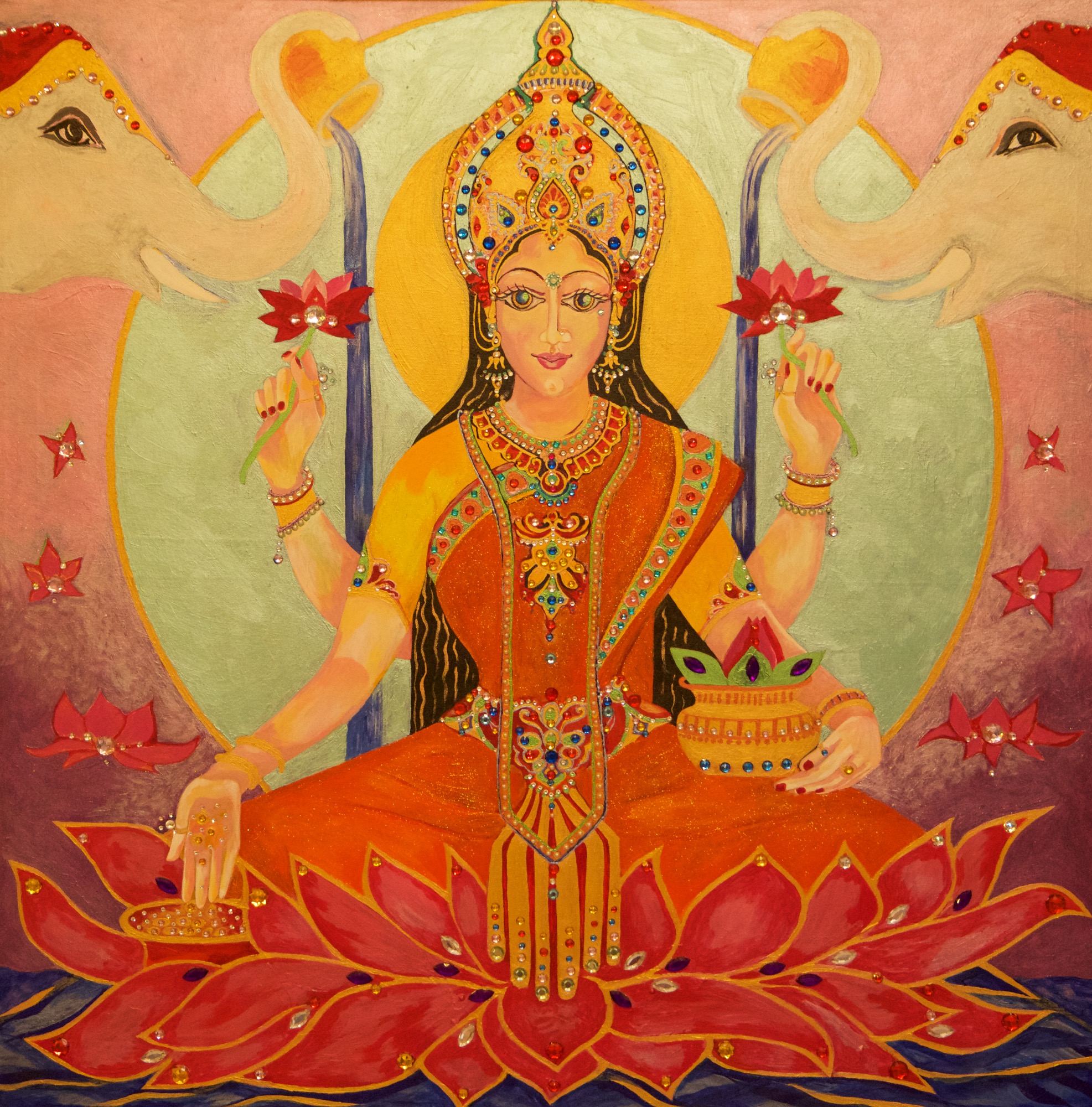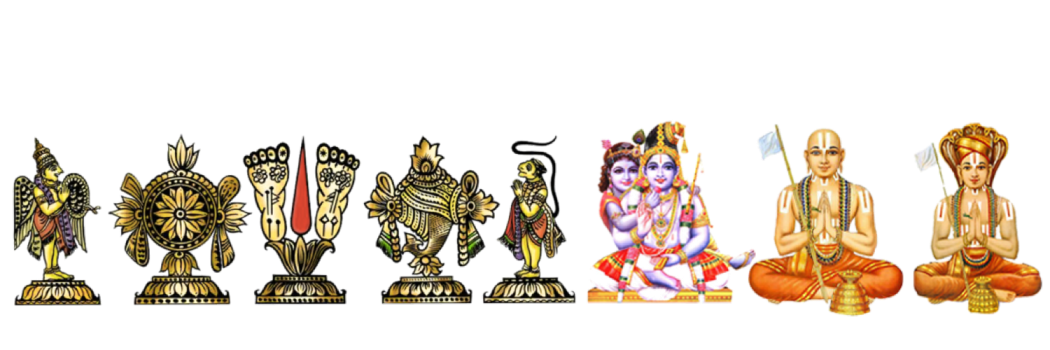Śrīḥ
Śrīmathē śatakōpāya namaḥ
Śrīmathē rāmānujāya namaḥ
Śrīmath varavaramunayē namaḥ
Śrī vānāchala mahāmunayē namaḥ
Introduction
The name of our tradition (Śrī Vaiṣṇavam) already indicates that we worhship divine mother Lakṣmī, whose short name is Śrī. Other Vaiṣṇava lineages also worship a motherly mediator between Bhagavan and Āthmās (for example, Rādha in the Hare Krishna lineage), but it seems fair to say that the theology of the goddess is most highly refined in our lineage.
This fact has not escaped the attention of academic researchers. We find in Oberhammer [1] an examination of the oldest surviving fragments of teachings about Lakṣmī in our tradition. In this examination, Yāmunāchārya’s Chatuḥślōkī is highlighted as the oldest complete text on the worship of Lakṣmī in our lineage. Oberhammer notes his surprise that it already conveys a full theology of the goddess. In Dhavamoney [2] we find a theological analysis of Chatuḥślōkī. And there is of course also some commentary work on this work within our own tradition, for example by Periyavāccan Piḷḷai.
In the line of our teachers, Yāmunāchārya (Tamil name Āḷvandhār) is the 4th Āchārya after the start of the “new” teaching tradition with Nāthamuni. Nāthamuni probably lived around the middle of the 9th century C.E.. Yāmunāchārya (early 10th century) saw Rāmānuja from a distance, but died on the very day Rāmānuja came to him to become his disciple.
Yāmunāchārya left us other important Stotrams (hymns) beside Chatuḥślōkī and some smaller scientific works. Rāmānuja’s work focuses on scientific texts, i.e. texts on Vedanta topics in the classical form of Indian spiritual science treatises: thesis – criticism of thesis – answer to criticism – conclusion. It is said that Rāmānuja thus followed the wish of Yāmunāchārya, who wanted to write such works but could not do so because of his poor health and advanced age. Academic researchers pointed out an extremely close link between the thinking of these two great Āchāryas. They find that Rāmānuja precisely continued the lines set out by Yāmunāchārya – almost like one Āchārya in two bodies!
So let us immerse ourselves in a text that is about 1000 years old. A text which makes the glory of our divine mother Śrī shine so wonderfully that no comparable text has been written in this long time. We give a synthesis of the translation on our mother site koyil.org [3] with the academic translations from [1], p.120 and [2]. We attempt to make the translation as literal as possible while preserving much of the beauty of the koyil.org translation.
Honoratory verse (Thaniyan)
Written by Rāmānuja, this verse leads many works of Rāmānuja.
yat padāmbhōruhadhyāna vidhvasthāśēṣa kalmaṣaḥ
vastutāmupayā thō’haṃ yāmunēyaṃ namāmi tam
I worship Yāmunāchārya, through whose mercy all my defects have been removed and I awoke from false identification. I recognized my true nature as Sat, as eternal Āthmā, by meditating on the lotus feet of Yāmunāchārya.
Verse 1
kāntaste puruṣottamaḥ paṇipatiḥ śayyāsanṃ vāhanaṃ
vedhāthmā vihageśvaro yavnikā māyā jaganmohinī |
brahmeśādisuravrajaḥ sadyitas tvaddāsadāsīgaṇaḥ
śrīrityeva ca nāma te bhagavati brūmaḥ kathaṃ tvām vayam ||
Your consort is puruṣottamaḥ, the supreme being, (and, as for him) your bed and seat is the lord of serpents (Adiśeṣa),
Your vehicle is the Lord of the birds, the guardian of the Vedas (Garuḍa), your veil is Māyā, which blinds the world.
Brahmā, Īśa (Śiva) and their companions are your servants like the other gods,
Śrī is your name, oh sublime one, but how can words praise your splendour?
The divine mother Śrī thus shares the decisive insignia of the supreme being, which we commonly call Nārāyaṇa (Nāra* = human being, *ayaṇa = refuge).
Verse 2
yasyāste mahimānamātman iva tvadvallabho’pi prabhuḥ
nālam mātumiyattayā niravadhiṃ nityānukūlam svathaḥ |
tām tvām dāsa iti prapanna iti cha stoṣyāmyahaṃ nirbhayaḥ
lokaikeśvari lokanāthadayithe dānte dayām te vidan ||
Your greatness exceeds even that which can be measured by your beloved (Nārāyaṇa), just like his own greatness.
You are always most compassionate towards us and so I praise you without fear!
I am your servant, you are my refuge; I know that your love is only for the One (Nārāyaṇa), mother of the world, beloved of the ruler of the world, so I speak, for I know your grace.
While the universal ruler Nārāyana mostly takes on the role of the father, who rewards and judges according to merits and misdemeanors, the divine mother Śrī takes on the role of the mother, who sees only the good in beings and pleads for forbearance. So while we should treat Nārāyana with utter respect and be fearful to be punished for our shortcomings, fear is inappropriate towards mother Śrī.
Verse 3
īṣat tvatkaruṇānirīkṣaṇsudhā sandhukṣaṇādrakṣayate
naṣtaṃ prāk tadhalābhatastribhuvanaṃ saṃpratyanantodayam |
śryo na hyaravinda locanamanaḥ kāntāprasādādṛte
saṃsṛtyakṣaravaiṣṇavādhvasu nṛṇāṃ saṃbhāvyate karhichit ||
Through a trace of the nectar of your compassionate gaze, the three worlds are preserved.
Without it, they were in destruction, through your gaze they now blossom again and without limits.
Without your grace, so dear to the lotus-eyed (Nārāyaṇa), no happiness can be found, neither in the material enjoyment of Saṃsāra, nor in the meditation on the unmanifest (the experience of the blissful aspects of Āthmā, as practiced in many Yoga paths and Buddhism) nor in the path of Vaiṣṇavas (the aspiration of eternal service to Śrīman Nārāyaṇa).
Verse 4
śāntānantamahavibhūthi paramaṃ yadhbrahma rūpam hareḥ
mūrtam brahma thathopi tatpriyataraṃ rūpam yadatydbhutam |
yānyanyāni yathāsukaṃ viharato rūpāṇi sarvāṇi tāni
āhuḥ svairanurūparūpavibhavair gāḍopagūḍhani te ||
The form of Hari (Nārāyaṇa) is the highest Brahman, infinite, peaceful and immensely unfolded, also the embodied Brahman, his lovable, wonderful figure (i.e. the avatars he takes for his divine activities) and all the other forms of himself that He takes at will, all of these are deeply interwoven with your own glory.
Conclusion
ākāratrayasampannām aravindanivāsinīm |
aśeṣajagadīśitrīm vande varadavallabhām ||
I adore her, the beloved of Varadha Perumal, adorned by loving service and complete dependence on him. Only he enjoys her qualities, he in whom all things rest and from whom everything develops.
Literature
[1] Gerhard Oberhammer: Materialien zur Geschichte der Rāmānuja Schule VI; die Lehre von der Göttin vor Veṇkaṭanātha. Österreichische Akademie der Wissenschaften, Wien, 2002.
[2] Mariasusai Dhavamoney: Yāmuna’s Catusślokī: an analysis and interpretation. Indologica Taurinensia VOLUME III-IV (1975-1976), Proceedings of the „Second World Sanskrit Conference“ (Torino, 9-15 June 1975)
[3] koyil.org Sri Vaishnava portal: chathu: SlOkI, based on the Tamil translation of the orgiginal text by U. VE. Pārthasārathy Aiyengār Swamy. http://divyaprabandham.koyil.org/index.php/2015/12/chathu-sloki/
Adiyen Mādhava Rāmānuja Dāsan
Edition of the koyil.org translation for a non-indian audience, integration of academic translations
Adiyen Sarathy Rāmānuja Dāsan
Adiyen Vangīpuram Satakōpa Rāmānuja Dāsan
Translation of the tamil translation into English



Ein Gedanke zu „Chatuḥślōkī – four verses to the goddess“